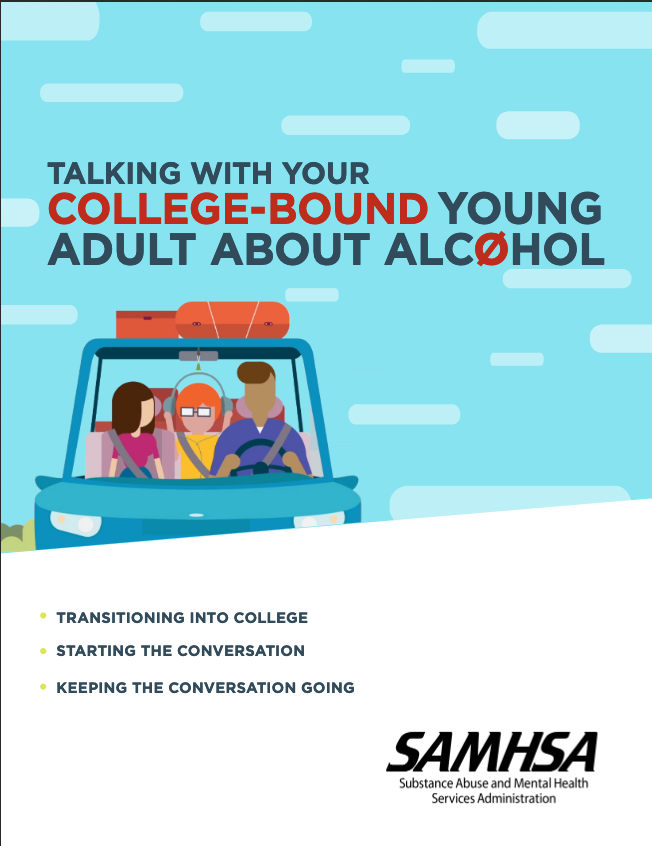 Talk with your young adult about avoiding underage drinking, even if you suspect alcohol use during high school. Research suggests that teens who talked with their parents about alcohol avoidance strategies before they began their first year of college were more likely to avoid alcohol, limit its use, and spend less time with heavy-drinking peers.
Talk with your young adult about avoiding underage drinking, even if you suspect alcohol use during high school. Research suggests that teens who talked with their parents about alcohol avoidance strategies before they began their first year of college were more likely to avoid alcohol, limit its use, and spend less time with heavy-drinking peers.
Students preparing to attend college have already taken several steps toward independence. Deciding where to go to college, what career path to pursue, and how to finance an advanced education are all choices in learning how to be an adult. But they are not there yet. Young adults still need and value their parents’ guidance as they make decisions about their future. One of these decisions will be about alcohol use at college—and parents represent the best source of advice on the issue.
Talk with your young adult about avoiding underage drinking, even if you suspect alcohol use during high school. Research suggests that teens who talked with their parents about alcohol avoidance strategies before they began their first year of college were more likely to avoid alcohol, limit its use, and spend less time with heavy- drinking peers.
Alcohol avoidance can help a student keep academic plans on track; alcohol use can disrupt a future.
Transitioning to College
College can overwhelm new students as they deal with changing social and academic expectations and the responsibilities that come with being on their own. It can be so challenging that about one-third of first-year students fail to enroll for their second year.
Some students may use alcohol as a way to cope with college pressures. They also might believe that alcohol use is common and socially expected among their new friends, and drink to fit in. Students, however, tend to significantly overestimate how often their fellow students use alcohol.
Due to these and other reasons, your young adult is entering an environment where alcohol use among 18- to 20-year-olds escalates dramatically. Overall, full-time first-year students tend to drink more than their peers who do not attend college—and suffer significantly more alcohol-related consequences.
New students appear most likely to initiate or increase alcohol use during their first six weeks of college.
Starting the Conversation
In talking with your young adult about alcohol, look for opportunities to raise the topic naturally. Discussions about majors and course selection can lead to a conversation about the ways in which alcohol use can disrupt academic success and career options. Housing selection can generate a discussion about whether substance- free residence halls are an option. Discuss ways to handle situations where alcohol use by other students might create a problem, such as interrupted study time or unwanted sexual advances. As you tour the campus area, note how many alcohol outlets are in the community. Emphasize that no matter where alcohol is available, underage drinking represents a risk and a choice that has consequences.
Conversation Goals
- Emphasize how underage drinking can undermine health, safety, and academic achievement.
- Make your no-alcohol use position clear.
- Demonstrate your willingness to help find constructive alternatives to drinking.
Become familiar with the school’s alcohol use policy together.
- Does the school have different sanctions for student athletes and those attending on scholarship?
- Does the school require new students to complete an online course in alcohol use prior to arriving on campus?
- How might eviction from a residence hall, being released from a team, or loss of a scholarship affect your young adult’s ability to remain in school?
Many colleges and universities are aware that communication between parents and students can support academic success. Contact the college your young adult will be attending for materials that offer tips on maintaining contact with students or talking about alcohol.
Discuss the many serious and potentially life-changing consequences of underage drinking. Point out that associating with students who drink heavily raises the risk of alcohol-related consequences, even for students who do not drink.
Make your position about alcohol use clear. Zero-tolerance messages appear to be most effective in preventing alcohol use and related consequences, even if a young person already is using alcohol.6 Describe your expectations for your young adult’s behavior while at college.
Instead of lecturing or issuing ultimatums to your young adult, talk in ways that show caring, trust, and respect.
If asked about your own past drinking behavior, be honest. Acknowledge the risks you took—and the consequences you may have experienced, from missing classes or exams to forgetting periods of time. Be prepared to answer such questions in ways that do not suggest that alcohol use is permissible.
Keeping the Conversation Going
Continue to keep the lines of communication open throughout all college years. Regular conversations show your continuing concern about your young adult’s well-being and also provide an opportunity to reinforce your zero-tolerance stance of underage drinking. Regular communication also makes it easier to check for any potential alcohol use or early signs of a problem. Academic, social, or emotional difficulties can be signs of heavy drinking as well as risk factors for alcohol use.
College is a significant investment of time and money. Help ensure that your young adult gets the most out of the college experience. What you say, or do not say, about alcohol can make a lifetime of difference.
Talking With Your College-Bound Young Adult About Alcohol is a free, downloadable guide from the Substance Abuse and Mental Health Services Administration (SAMHSA) for parents and caregivers of college-bound young adults. The guide contains information about the consequences of underage drinking and offers tips for engaging in a constructive dialogue with young adults.
Visit the SAMHSA website to view additional free materials from the Talk, They Hear You campaign.
Source: Substance Abuse and Mental Health Services Administration | Talking With Your College-Bound Young Adult About Alcohol, https://store.samhsa.gov/product/Talking-With-Your-College-Bound-Young-Adult-About-Alcohol/sma18-4897 | public domain, Printed in 2015, revised in 2023
Do you need someone to talk to? CHC can help. We invite you to call or email our Care Coordinators at 650.688.3625 or careteam@stage.chconline.org to set up a free 30-minute consultation.






